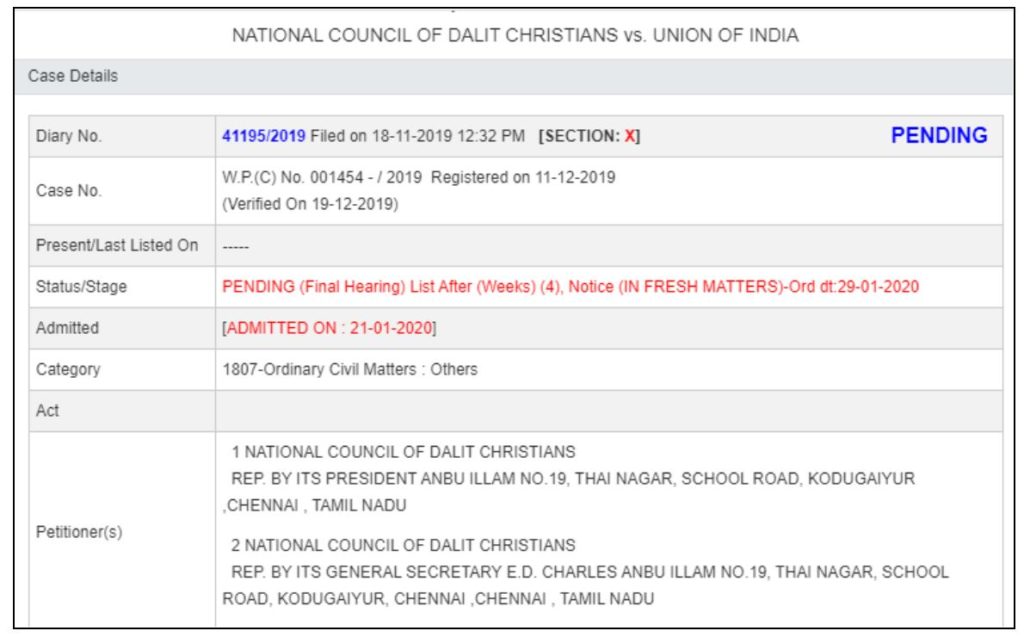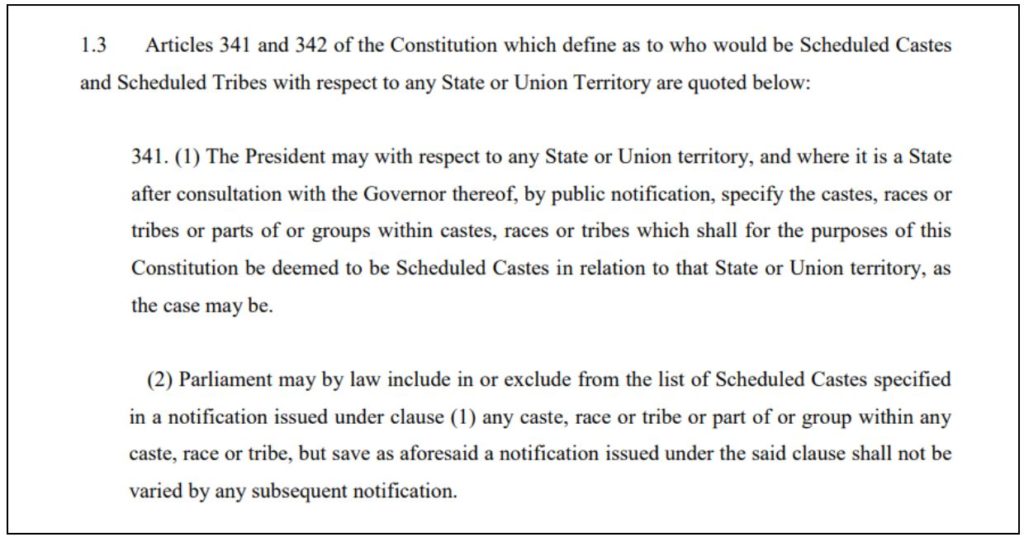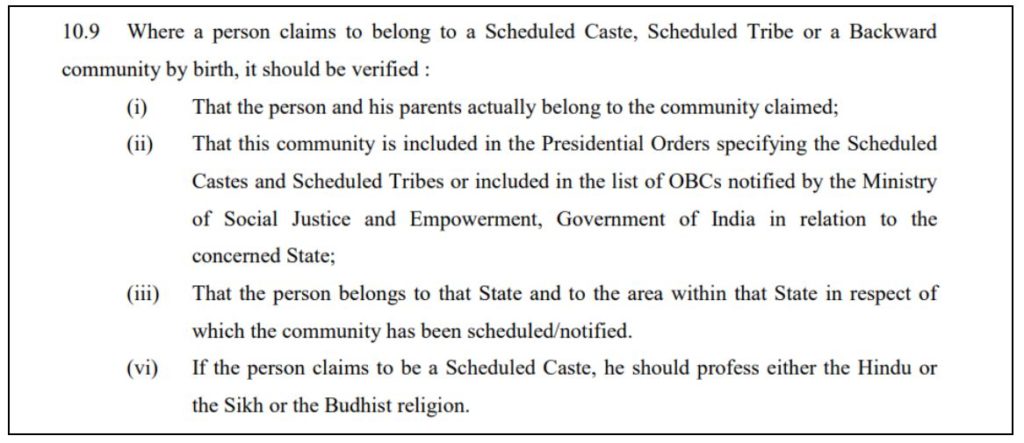In this article, we explore the dynamics around caste, religious conversions, and reservation. We look at what happens when someone from the Schedule Caste Category converts to a religion other than Hindu, Sikhism & Buddhism with respect to their caste status and reservation policy.
On 11 February 2020, in response to a Rajya Sabha question, the Union Law Minister reiterated that only those who belong to Hindu, Sikhism & Buddhist faiths are considered as Dalits (Scheduled Castes), according to the Constitution (Scheduled Castes) Order 1950. The response was to a question, “Whether the government is considering making changes to the election rules, categorically stating that the Dalits who have accepted Christianity or Islam would be not eligible to contest from SC reserved seat”. The Minister has clarified that, currently, there is no such proposition.
Petitions challenging the above-mentioned order, which limited Scheduled Caste status to Hindus and was later amended to include Sikhs and Buddhists, is pending in the Supreme Court. A 2004 writ petition challenging the order, filed by the Centre for Public Interest Litigation, was joined by other petitions including a case filed by the National Council of Dalit Christians (NCDC) in January 2020.

Broadly, the plea is to make reservations religion-neutral so that Dalit Christians and Muslims too can benefit. In a 2008 report titled ‘Dalits in the Muslim and Christian Communities’, the National Commission on Minorities highlighted that there is a strong case for including Dalit Muslims and Dalit Christians in the Scheduled Caste category. The report emphasizes that there is ample socio-scientific evidence on the discrimination faced by Dalit Muslims and Dalit Christians.
Caste Categories & Reservation
There are several official classifications of the population in India including General Class, Other Backward Castes, Scheduled Castes, and Scheduled Tribes. In the context of caste and reservations with respect to Dalits (Scheduled Castes), we will look at the definitions of Scheduled Caste and Other Backward Castes.
How is the Scheduled Castes (SCs) category defined?
Scheduled Caste is the official name given to a group of sub-caste/communities within the framework of the Hindu caste system. These castes have historically faced deprivation, oppression, and extreme social isolation in India on account of their perceived ‘low status’ in orthodox Hindu practices. The Scheduled Castes are sometimes also referred to as Dalit.
According to the Constitution (Scheduled Castes) Order 1950, only marginalised groups/communities that profess Hinduism, Sikhism and Buddhism can be members of the Scheduled Caste. Originally, only Hindus were eligible for reservation under the Scheduled Caste quota, but in 1956, Sikhs were included, and in 1990, Buddhists. Communities/castes of other religions cannot be included in the list of Scheduled Castes. In other words, Muslim & Christian groups are effectively barred from being included in the list of SCs.

Articles 341 of the Constitution defines who would be Scheduled Castes with respect to any State or Union Territory. A state-wise list of SCs is maintained by the Indian Ministry of Social Justice and Empowerment. The Central Government can include or exclude communities & groups in this list.

How is the Other Backward Classes (OBCs) category defined?
Other Backward Classes (OBCs) is an official name given to caste/communities that are educationally or socially disadvantaged. The Constitution does not define Other Backward Classes. Successive governments in the 1980s expressed their intent to provide reservations to the backward classes. The Mandal Commission report submitted in the 1980s recommended 27% reservation for backward classes. In the year 1990, the then government declared that it would provide 27% reservations to “socially and educationally backward classes” for jobs in central services and public undertakings. In order to this extent was also issued. However, the constitutionality of this order was challenged in the supreme court. The Supreme Court in Indira Sawhney’s case, upheld this order but made the following clarifications.
- Since reservation under Article 16(4) could be for any class of citizens, the principle of identification of backward classes has to be of universal application so as to extend to every community & religion.
- Reservation being an extreme form of protective measure or affirmative action it should be confined to a minority of seats. Even though the Constitution does not lay down any specific bar but the constitutional philosophy being against proportional equality, the principle of balancing equality ordains, reservation of any manner, not to exceed 50%.
- Creamy layer amongst the backward class of citizens must be excluded by fixation of proper income, property, or status criteria.
In pursuance of this judgment of the SC, the Government enacted the National Commission for Backward Classes (NCBC) Act in April 1993.) The Commission’s job is to examine requests for inclusion of any class of citizens as a backward class in the lists and hear complaints of over-inclusion or under-inclusion of any backward class in such lists and also provide advice to the Central Government. The Central Government is also supposed to undertake a revision of the OBC lists every ten years or at periodic intervals to exclude or include particular classes. The classes of citizens to be included in OBCs would be other than those included in SCs and STs. The list of OBCs is maintained by the Indian Ministry of Social Justice and Empowerment. The list is dynamic with castes and communities being added or removed depending on their social, educational, and economic factors.
In other words, unlike the SCs, caste groups & communities from any religion can be included in the OBC list of a particular state or states depending on their social, educational & economic backwardness. Hence Hindus, Sikhs, Buddhists, Muslims, Christians can all be made part of the OBC list.
What happens to caste categories after conversion?
On attainment of independence, instructions were issued for reservation of 12.5% of vacancies for SCs in respect of recruitment made by open competition (and in case of recruitment other than by open competition this percentage was fixed at 16.7%). After the 1961 Census, the percentage of reservations for SCs was increased from 12.5% to 15%. In 1993, the Government introduced reservations for Other Backward Classes (OBCs) in direct recruitment broadly at the rate of 27%.
The Constitution (Scheduled Castes) Order, 1950 (as amended from time to time) clarifies that no person professing a religion other than Hinduism or Sikhism, or Buddhism can be deemed to be a member of a Scheduled Caste. There is, however, no religious bar for being treated as Other Backward Class as noted earlier.
As no person professing a religion other than Hinduism or Sikhism or Buddhism can be deemed to be a member of Scheduled Castes, the letter of appointment issued to Scheduled Caste candidates mentions that they should report the change of their religion, if any, to their appointing/ administrative authority immediately.

A number of steps are undertaken to verify caste status when a person claims to belong to a Scheduled Caste, Scheduled Tribe, or a Backward community. In the case of Scheduled Caste, it is verified if they belong either to the Hindu or Sikh or Buddhist religion.

In case of conversion and re-conversion, there are three scenarios with respect to the status of Scheduled Caste status:
- When a Scheduled Caste person gets converted to a religion other than Hinduism or Sikhism or Buddhism, they cease to be members of the Scheduled Castes (SC), and hence they are not eligible for the SC reservation. However, based on their social and educational disadvantages, they could become members of Other Backward Castes (OBCs). Several states have specified categories for religious converts from Scheduled Castes under the OBCs list.
- When a Scheduled Caste person gets converted to a religion other than Hinduism or Sikhism or Buddhism and then reconverts back to Hinduism or Sikhism or Buddhism, they will be deemed to have reverted to their original Scheduled Caste, if they are accepted by the members of that particular caste as one among them.
- In the case of a descendant of a Scheduled Caste convert, the mere fact of conversion to Hinduism or Sikhism or Buddhism will not be sufficient to entitle them to be regarded as a member of the Scheduled Caste to which their forefathers belonged. It will have to be established that such a convert has been accepted by the members of that particular caste as one among them and has thus become a member of that caste.
What this means is that even after conversion to a religion other than Hinduism or Sikhism or Buddhism, a Scheduled Caste person may be entitled to reservation under the OBC quota if such a group is included in the list of OBCs. Many such groups are included in the OBC list of various states, giving them the benefit of the OBC quota. For instance, this recent notification of the Kerala Public Service Commission has a post reserved for the ‘Scheduled Caste Converted to Christianity (SCCC)’ under the OBC quota.
The following table shows a state-wise list of specified categories for religious converts from Scheduled Castes under the OBCs list. The list is a compilation of entries from the state-wise list of OBCs maintained by the Indian Ministry of Social Justice and Empowerment and a 2008 report titled ‘Dalits in the Muslim and Christian Communities’, the National Commission on Minorities.
Featured Image: Scheduled Caste conversion


